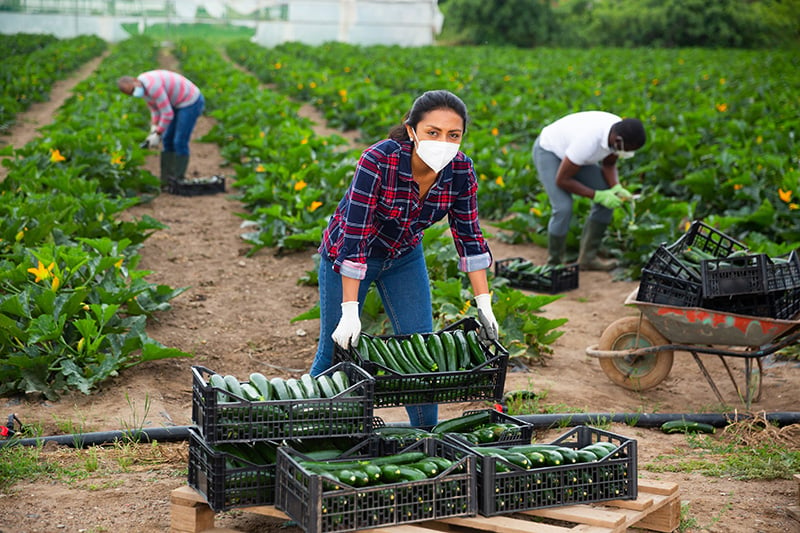Are Agriculture Workers Exempt from Workers' Compensation Insurance?
 The physical requirements of farming alone make agriculture a high injury risk profession. Despite high injury and fatality rates, many agricultural workers are left out of workers' comp benefits.
The physical requirements of farming alone make agriculture a high injury risk profession. Despite high injury and fatality rates, many agricultural workers are left out of workers' comp benefits.
According to the Bureau of Labor Statistics, farming is one of the most dangerous jobs in the country. Most recent data from 2019 found that working in agriculture was twice as fatal as law enforcement occupations and seven times as deadly than the work of firefighters. The physical requirements of farming alone make agriculture a high injury risk profession. Over 60 agricultural workers per 100,000 are killed annually, mostly from farming equipment such as tractors, and the injury rate is also one of the highest. Injuries from farming also occur from areas outside equipment and machinery operation. The handling of livestock and exposure to chemical pesticides places agricultural workers at a greater risk than average for certain diseases from the nature of the occupation. These risks, coupled with the COVID-19 pandemic, have only exacerbated the already hazardous situation in agriculture.
Despite high injury and fatality rates, many agricultural workers are left out of workers' comp benefits. Farm and agriculture employees are usually listed as exempted occupations in their states, resulting in many farm owners and operators not electing to carry workers' comp coverage. Most recent numbers show that only 13 states require workers’ comp with limited exceptions; Arizona, California, Colorado, Connecticut, Hawaii, Idaho, Massachusetts, Minnesota, Montana, New Hampshire, New Jersey, Ohio, and Oregon. D.C., Puerto Rico, and the U.S. Virgin Island also require workers’ comp coverage to agriculture workers. Currently, 15 states do not provide any workers’ comp benefits to agricultural employees; Alabama, Arkansas, Delaware, Georgia, Indiana, Kansas, Kentucky, Mississippi, Missouri, Nebraska, Nevada, North Dakota, South Carolina, Tennessee, and Texas. Of the top 10 states for agriculture in terms of cash receipts, 8 of 10 do not provide coverage for agricultural workers or have state exemptions to avoid workers' comp insurance.
Workers' comp surrounding agriculture is on a state-to-state basis, and there are a variety of exemptions, requirements, and limitations to each state's current statutes. States like Florida require workers’ comp for six or more regular employees and or 12 seasonal employees that work more than 30 days. Meanwhile, Virginia requires workers’ comp coverage when a farm has more than 3 full-time employees. Most states have exemptions like Virginia's and Florida's to protect smaller farms that may face heavier financial burdens if taking on workers’ comp insurance. Other states like South Dakota require workers’ comp coverage for specific workers who operate certain farm machinery deemed hazardous.
Attitudes around agriculture workers and workers' comp have changed recently due to the Covid pandemic. With some states adding Covid presumptions for frontline and essential workers, many farmworkers are eligible for workers’ comp benefits for the first time. COVID-19 presumptions, although new, may help with reasoning to expand the realm of coverage to include agricultural workers under general workers' comp statutes.
The workers' comp landscape is changing in agriculture. Although a few states have included agricultural workers in their Covid presumptions, there remains a long road for more extensive coverage. Looking to the future, workers’ comp benefits for farmworkers will face their fair share of legal challenges and require complex legislative navigation to provide coverage for workers in one of the country's most dangerous and deadly economic sectors. Currently, most workers’ comp coverage for agriculture workers remains restrictive.
Other Posts You Might Be Interested In
Does Workers’ Compensation Cover Remote Workers?
Read MoreWorkers' Comp 101: What Are My Rights Under Workers' Compensation?
Read MoreIs Workers' Compensation Protecting U.S. Postal Service Workers?
Read MoreSubscribe to email updates
Stay up-to-date on what's happening at this blog and get additional content about the benefits of subscribing.

